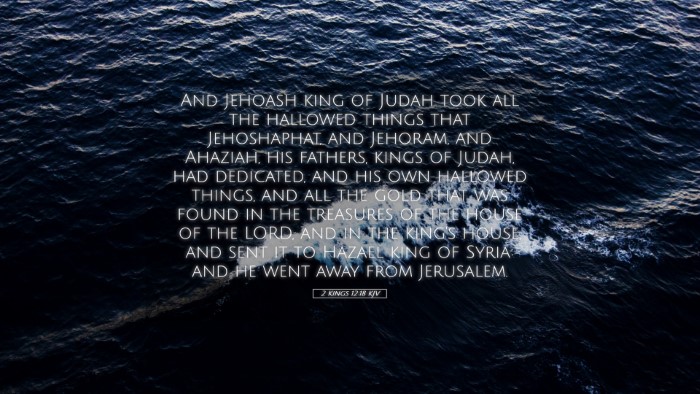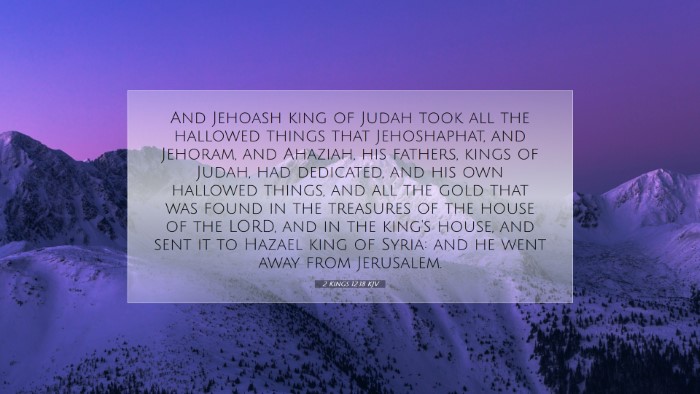Old Testament
Genesis Exodus Leviticus Numbers Deuteronomy Joshua Judges Ruth 1 Samuel 2 Samuel 1 Kings 2 Kings 1 Chronicles 2 Chronicles Ezra Nehemiah Esther Job Psalms Proverbs Ecclesiastes Song of Solomon Isaiah Jeremiah Lamentations Ezekiel Daniel Hosea Joel Amos Obadiah Jonah Micah Nahum Habakkuk Zephaniah Haggai Zechariah Malachi2 Kings 12:18
2 Kings 12:18 KJV
And Jehoash king of Judah took all the hallowed things that Jehoshaphat, and Jehoram, and Ahaziah, his fathers, kings of Judah, had dedicated, and his own hallowed things, and all the gold that was found in the treasures of the house of the LORD, and in the king's house, and sent it to Hazael king of Syria: and he went away from Jerusalem.
2 Kings 12:18 Bible Commentary
Commentary on 2 Kings 12:18
2 Kings 12:18 states:
"And Jehoash king of Judah took all the hallowed things that Jehoshaphat, and Jehoram, and Ahaziah, his fathers, kings of Judah, had dedicated, and his own hallowed things, and gave them unto the servants of the king of Syria: and they went away." (KJV)
Contextual Background
This verse occurs during the reign of King Jehoash (Joash) of Judah. Jehoash was notable for his initial reformative actions concerning the Temple of Yahweh, yet this passage highlights a significant departure from his earlier deeds. The historical setting is crucial, where the political landscape was characterized by conflict with surrounding nations, particularly Syria.
Commentary Insights
The following insights amalgamate thoughts from renowned public domain commentators to provide a multi-faceted understanding of this passage.
Historical Significance
- Matthew Henry notes that Jehoash's actions here reflect a moment of desperation. The king sought to appease the threat from Ben-Hadad, the king of Syria, by sacrificing sacred items meant for the worship of God in the Temple.
- Albert Barnes emphasizes the gravity of such an action, as these hallowed items represented the devotion and covenant between God and the people of Judah. Jehoash's decision reveals a troubling trend in leadership where political expediency overtook spiritual fidelity.
- Adam Clarke explains that this act was not merely a common political maneuver but a striking breach of covenantal relationship with God. By giving away sacred items, Jehoash exhibited a lack of faith in Yahweh, contrasting with the earlier religious reforms he had undertaken.
Moral and Theological Implications
- Matthew Henry articulates that this moment serves as a reminder of the precarious nature of faithfulness. What began as a devotion to restoring the Temple ultimately unraveled into a scenario where Jehoash attempted to resolve crises through human ingenuity rather than divine guidance.
- Albert Barnes highlights the theological implications of Jehoash's actions, suggesting that reliance on material wealth and political alliances can jeopardize the covenant relationship with God. This behavior invites contemplation on modern parallels where the church may sometimes prioritize political influence over spiritual integrity.
- Adam Clarke points out that Jehoash's unwise decision reveals an underlying issue of trust. Instead of seeking God, he resorted to worldly wisdom, underscoring the necessity for faith and reliance upon God’s sovereignty in times of trouble.
The Role of Divine Providence
This passage invites readers to consider God’s providential hand in historical events. Despite Jehoash's faltering faith, God's purpose remains unthwarted.
- Matthew Henry reflects on the divine oversight even when human leaders fail. God maintained His covenant and had larger plans for Judah, which would ultimately culminate in the coming Messiah.
- Albert Barnes emphasizes that even the decisions of ungodly leaders cannot hinder God’s overarching plan for His people. This aspect of divine sovereignty reinforces the theological belief that God works through both righteousness and unrighteousness.
- Adam Clarke interprets this as a reminder that God can draw good from human failures, although it does not excuse the actions taken. Instead, it calls for a return to faithfulness and dependence on God.
Contemporary Applications
For pastors, students, theologians, and Bible scholars, the implications drawn from 2 Kings 12:18 resonate deeply in today’s context:
- Faithfulness in Leadership: Leaders must recognize the weight of their decisions and the potential harm of prioritizing political strategies over spiritual truths.
- The Cost of Compromise: The narrative warns against the costly compromises that may arise from fear or pressure from external forces. It is essential to maintain integrity and fidelity to God.
- Dependence on Divine Guidance: In crisis, the faithful are reminded to seek God first, not resorting to worldly solutions that may lead to spiritual detriment.
Conclusion
2 Kings 12:18 elucidates a moment of tension and transition within Judah’s monarchy. The insights derived from public domain commentaries reveal a rich tapestry of historical context, moral implications, and the theme of divine providence. Leaders and followers alike are called to embrace faithfulness, recognizing that true peace and security come not from worldly alliances but from a steadfast relationship with God.


